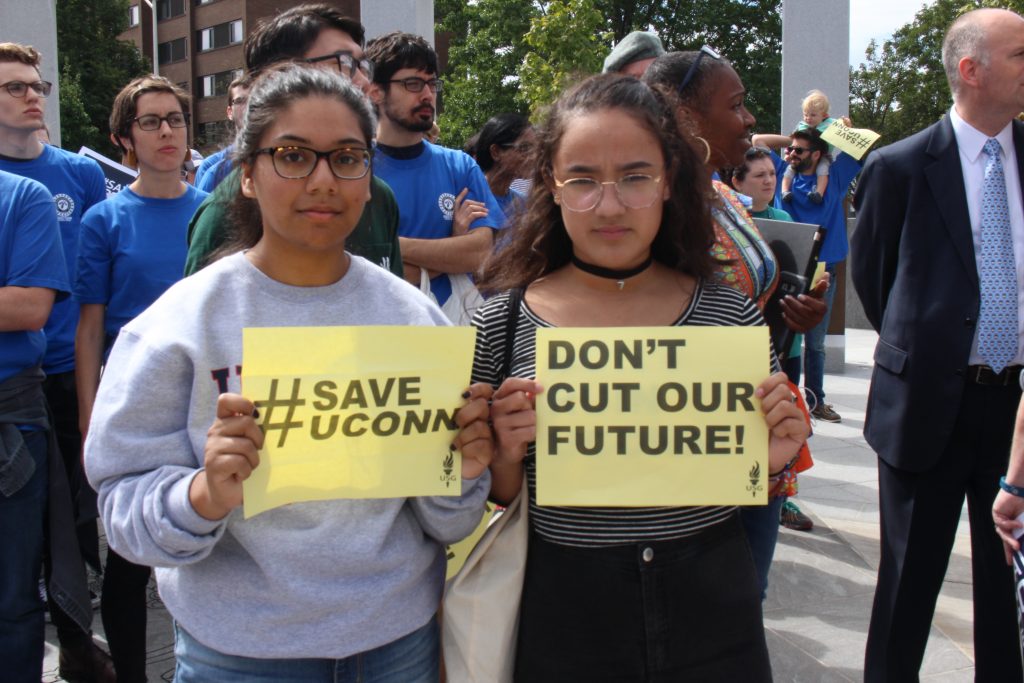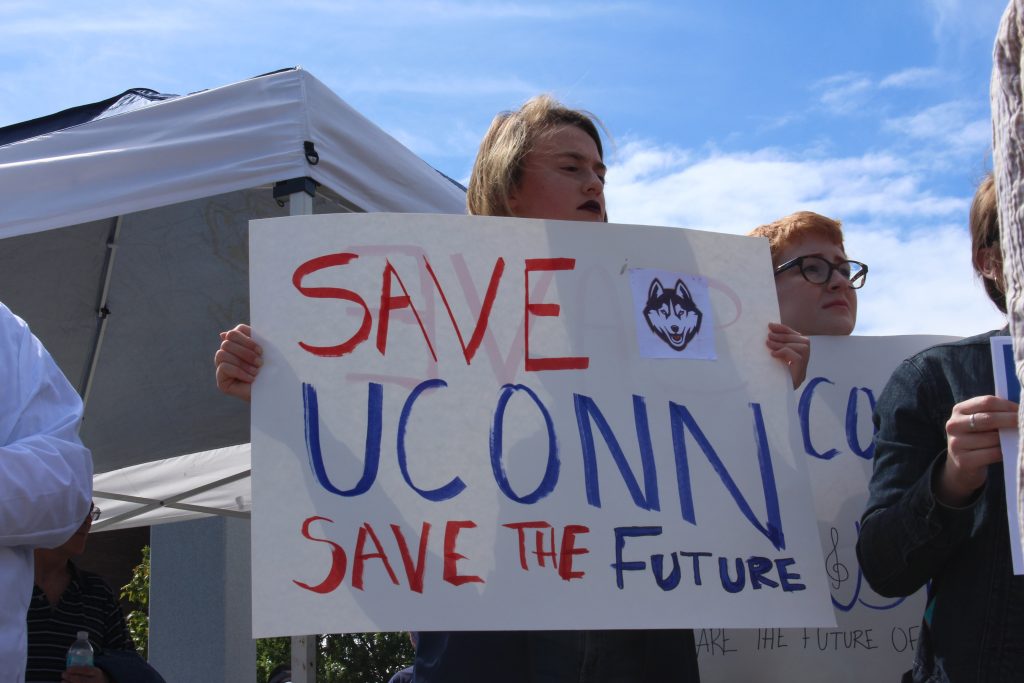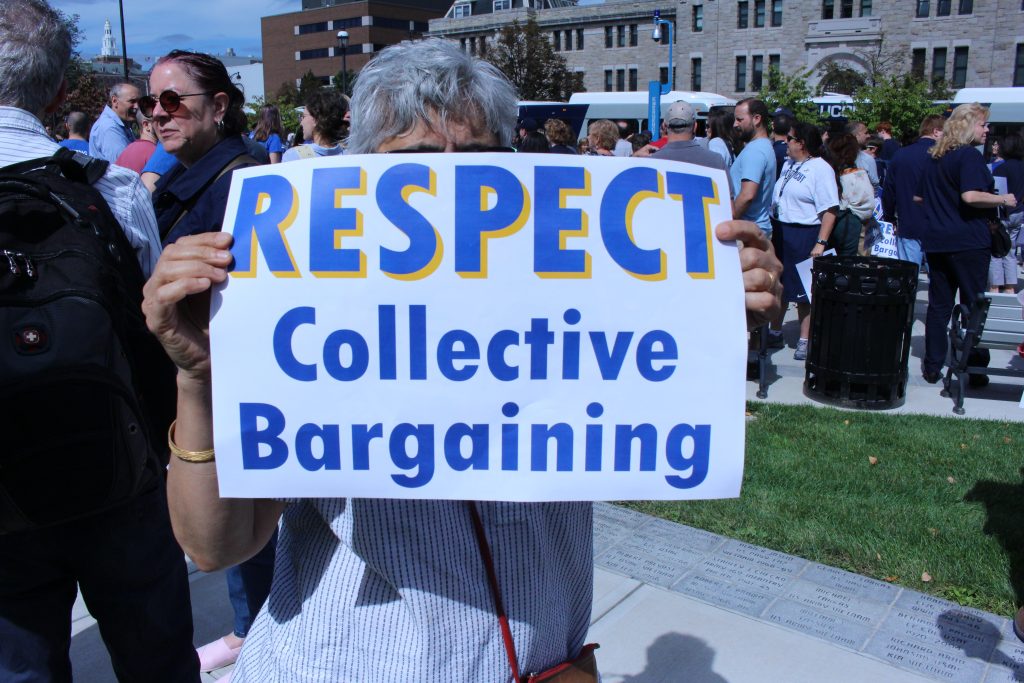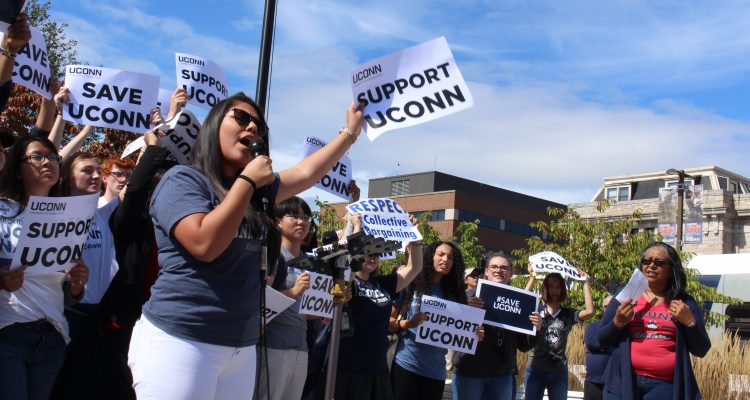By Aleysa Negron Carrero
University of Connecticut students, faculty, and scores of Connecticut residents gathered at the Legislative Office Building in Hartford on Friday to express their anger with the state budget recently approved by the Connecticut General Assembly.
This budget sees UConn’s state funding cut by more than 300 million dollars over the next 2 years.
According to the statement released by UConn President Susan Herbst, consequences of the budget cut would include major reductions to need- and merit-based financial aid; elimination of majors and graduate programs; dramatically larger classes and waitlists that will make it challenging for many students to graduate in four years and the closure of UConn Health.
The demonstration in Hartford is the second gathering of students to protest the budget since its announcement last week.

Student demonstrators holding #SaveUconn signs. Photo by Aleysa Negron Carrero
On Wednesday, September 20th, more than 1,000 students and faculty members gathered outside the Fieldhouse in the Storrs Campus for a rally organized by the Undergraduate Student Government and Graduate Student Senate.
USG President Irma Valverde also spoke at Friday’s demonstration in Hartford and shed some light on the power of unifying students in times of uncertainty for the UConn Community.
“ …my responsibility as the USG President is to really inform students about what is happening, and to try and gather them and to bring them together. That’s exactly what we did on Wednesday and that’s also what we did today…it’s always going to be about educating people on what is happening and bringing them together so that we can show up and speak up against what’s happening right now. ”
Valverde also spoke to the importance of students making their voices heard and being at the forefront of advocating on their own behalf.
“At the end of the day these are the people that are gonna be the future doctors, future lawyers, future politicians; so these are students that are gonna be in those seats in just a decade or so, maybe even earlier…The more that [politicians] keep pushing against us and not listening to us, the more that people are gonna be active, that are gonna be wanting to serve in public service and are gonna be taking those seats and voting for things that are actually gonna improve our economy and that will also improve our state. ”

Student demonstrator holds sign stating “Save UConn. Save the future.” Photo by Aleysa Negron Carrero
Head of the UConn Sociology Department Manisha Desai expressed that all departments have the capacity to be impacted from the budget cuts in different ways, and that no fields were necessarily more protected than others from the proposed budget
“I have to say that my STEM colleagues also feel the pressure because they have to bring in their own money and support their own graduate students and their own labs, so it’s not as if they’re getting all the funding either. They have to bring their own funding in.”
Faculty also voiced concerns that this budget cut would increase the amount of class sessions and student enrollment. This limits the ways professors can contribute to the university and to their students.
Edith Barrett, Director of Urban and Community Studies at UConn Hartford, talked about the ways a budget cut impacts the value of a UConn education.
“300 million dollars is a significant cut to our budget, for which we really cannot adequately serve our students. We won’t be able to offer the courses that our students need, we won’t be able to support our graduate students who need funding to go to graduate school, and it will greatly diminish the quality of UConn’s education.”
Barrett also stated that without the continued resources to hire adjuncts or graduate students, and professors taking on more course loads, faculty would be greatly inhibited on their capacity to produce research, falling back on UConn’s reputation as a tier 1 public research university.
“Our goal is to educate students, and do research, and do public outreach. If you make us focus on teaching, you’re cutting away at our public service and our research.”

UConn Sociology Head Manisha Desai holds “Respect Collective Bargaining” sign. Photo by Aleysa Negron Carrero
According to Herbst’s announcement, student support services and resources are also threatened when budgets are cut.
Fany DeJesus Hannon, Director of the Puerto Rican/ Latin American Cultural Center, spoke about the future of PRLACC and other cultural centers after significant budget cuts.
“So all of us, what we do is supporting our students academically; in leadership development, student development, cultural identity. So we are at risk. And it’s unacceptable and problematic.”
Hannon discussed that though cultural centers are not perceived as an academic resource in the traditional sense, they serve an important purpose in establishing a campus culture and fostering inclusivity.
“As UConn keeps moving to be the number 18th university in the rankings but also a global university, we need our cultural centers, and we need any other program that is enforcing and reinforcing diversity, inclusion and social justice.”
Valverde urges audience members to keep fighting for UConn.
“Do not be silent right now, okay? So please, support UConn and save UConn now more than ever. We cannot afford these budget cuts.”


